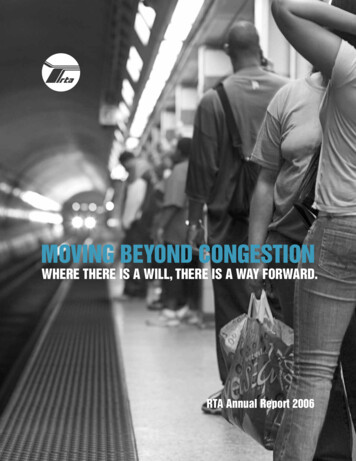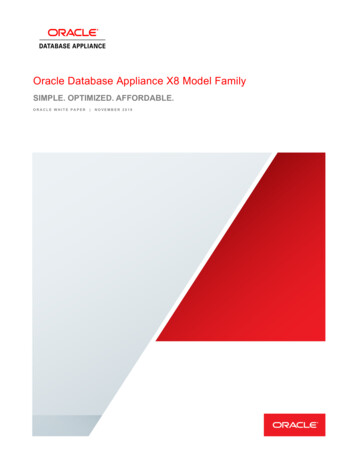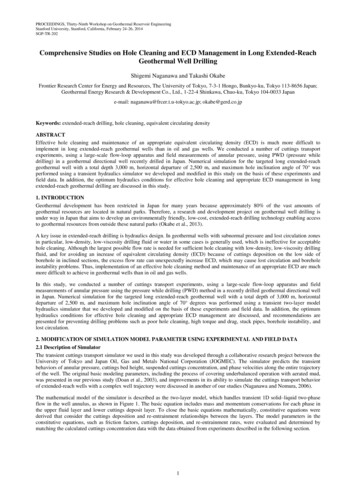
Transcription
How to Reachthe WestAgainBY TIMOTHY KELLER14
BY TIMOTHY KELLERWe are entering a new era in whichthere is not only no social benefitto being Christian, but an actualsocial cost. In many places,culture is becoming hostile toward faith more andmore, and beliefs in God, truth, sin, and the afterlifeare disappearing in more and more people. Now,culture is producing people for whom Christianity isnot only offensive, but incomprehensible.Church leaders must find new ways to reach peoplewho won’t even think about coming to church orbelieving Christianity’s most basic concepts. Andwe must find ways of churching and forming peopleas Christians in the midst of a very different culture.Let’s call this the “Outward Move” and the “InwardMove” of a missionary encounter with Westernculture.To clarify, a missionary encounter is not awithdrawal from culture into communities withlittle connection to the rest of society. Nor is itan effort to get political power in order to imposeChristian standards and beliefs on an unwillingpopulace. Nor is it such an effort to become relevantthat the church becomes completely adapted to andassimilated by the culture.Instead, a missionary encounter connects (unlikethe strategies of withdrawal) yet confronts (unlikethe strategies of assimilation) and thereforeactually converts people (unlike all the strategies,including that of political takeover). A churchhaving a missionary encounter also does maintainits distinctiveness (which is what the withdrawalapproach wants) and it does often affirm and alwaysserve neighbors (which is what the assimilationapproach wants) and it does call people to repentand change (which is what the politically assertiveapproach wants). And since our Western culture ispost-Christian, this will not look exactly like anymissionary encounter that the church has had in thepast.15
Here are five basic elements to having a missionarycommunities and families decline, and not freeencounter with Western culture.1subjectively, as we experience inner loneliness andenslaving addictions.1. Christian High TheoryBefore we can explain the gospel to a culture, wemust explain the culture with the gospel.Historically, apologetics involves giving argumentsand evidences for the truth of Christianity. Suchapologetics, as in arguing for the historicity ofthe Resurrection, go back all the way to the NewTestament (1 Corinthians 15). But the early ChristianThis work is largely going to be the work ofChristians in the academy, who may have the helpof non-Christians scholars and thinkers who seethe fatal flaws in late modernity. Many have focusedon the problem of unchecked individualism,the problem of the modern self, the problem ofrelativism—all of which are intensified in modernculture.apologists, from Justin Martyr to Augustine, didmore than that. They did not merely try to show2. A Truly Post-Christendom Evangelistic Dynamicthat Christian practice and beliefs came up to theWestern churches have many evangelistic methodsstandards of pagan culture. Instead, they developedand programs, but they often assume that there area radical critique of pagan culture that showed howplenty of non-Christians who acknowledge basicpagan culture, by its own standards, failed. In Theconcepts of God, truth, sin, and an afterlife andCity of God, Augustine developed what would todaywill seek out the church or are open to invitation.be called “critical theory,” or High Theory. He usedTo reach today’s culture, we must find a modernthe gospel to critique the dominant culture.version of the evangelistic dynamic of the earlychurch, which grew through conversion in aToday, a biblical or Christian High Theory wouldsimilarly hostile and non-comprehending culture.seek not so much to live up to our secular culture’sThe elements of such a dynamic include:standards of rationality, but would reject thestandards and question its claims of neutrality,Intentionalityobjectivity, and universality. A Christian HighMichael Green estimates that 80% or more ofTheory would engage the late modern secular viewevangelism in the early church was done notof the world publicly, exposing its severe problemsby ministers or evangelists, but by ordinaryon the basis of its own framework of beliefs,Christians identifying and explaining themselvesshowing how its basic narratives do not fit humanto their oikos—their network of relatives and closenature and intuitions, and proclaiming the gospel asassociates.2 People paid attention to the gospelthe counterpoint. In particular, it should show how,because someone they knew well, worked with, andin an effort to free the individual self completely, theperhaps loved, spoke to them about it.modern secular framework has led to our moderncondition in which:Alternative AnswersHelping non-Christians recognize they have a All values are relativeproblem that requires salvation requires questioning All relationships are transactionspeople’s answers (even before answering their All identities are highly fragile, andquestions or objections to Christianity). By All (supposed) sources of fulfillment are“people’s answers,” we mean their workingdisappointing.answers to the big questions of life. No one can livewithout meaning, satisfaction, freedom, identity,16We are still not free: not free objectively, as localways to get and give forgiveness, ways to resolve1 See: Larry Hurtado. Destroyer of the Gods (Baylor, 2017).2 Michael Green. Evangelism in the Early Church (Eerdmans, 2004).
moral questions, and hope for the future. Culture’s3. A Category-Defying Social Projectways to provide these things ultimately will notIn Destroyer of the Gods, Larry Hurtado seekswork, and if we have their attention (usuallythrough intentionality) we can, at the opportunetime, point to the unsurpassed fulfillmentsChristianity can provide: a meaning in life that suffering can’t take away(and even deepen) a satisfaction not based on circumstances a freedom that does not turn community andlove relationships into thin transactions an identity that is not fragile, not based onperformance or exclusion a way to deal with guilt and to forgive withoutresidual bitterness or shame a basis for seeking justice that does not turn youinto an oppressor yourself a way to face not only the future, but deathitself with poise and peacePut another way, we must help non-Christians seethat their indelible needs and longings for thesethings are actually echoes of their need for God.to explain why an increasing number of peopleconverted to Christianity in the Roman world, eventhough it was the most persecuted of all religionsand carried significant social cost. But Hurtadospeaks of the unique Christian social project—aunique kind of human community that defiedcategories then and will still do so today.3 It has atleast five elements that could be broken down andexpounded at greater length, but which also needto be seen together, as they constitute a whole. Theearly church social project was: Multi-racial and multi-ethnic Highly committed to caring for the poor andmarginalized Non-retaliatory, marked by a commitment toforgiveness Strongly and practically against abortion andinfanticide Revolutionary regarding the ethics of sexThe early Christian community was both offensiveand attractive. But believers did not construct theirGood NewsWe also have to explain the gospel in a way that iscompelling and attracts many late modern people.The gospel is that “Salvation comes (only from) theLord” (Jonah 2:9). Gospel presentations must alwaysmake two points: The bad news: you are trying to save yourself,but you can’t. The good news: you can be saved through Christalone, not your efforts.In traditional culture, in which the basic narrativeis “the meaning of life is to be good,” the bad newsand good news look different from late modernculture, in which the basic narrative is “themeaning of life is to be free.” We need to flesh outa new gospel presentation and new approaches forsocial project in some strategic way to reach Romanculture. Each of the five elements was there becauseChristians sought to submit to biblical authority.They are all commanded. They are just as categorydefying—both offensive and attractive—today. Thefirst two views on ethnic diversity and caring forthe poor sound “liberal” and the last two views onabortion and sexual ethics sound “conservative.”But the third element, of course, sounds likeno particular party. Churches today are underenormous pressure to jettison the first two or thelast two but not to keep them all. Yet to give up anyof them would make Christianity the handmaidof a particular political program and undermine amissionary encounter.4. Counter-Catechesis for a Digital AgeBy using the word “catechesis,” I am not necessarilycorporate worship.3 Larry Hurtado. Destroyer of the Gods (Baylor, 2017).17
calling for the use of the actual catechism methodgain the reins of coercive power, or took a moreof question-and-answer. I am a proponent of thatwithdrawn approach in which being a Christian wasmethod, but that’s not my point here. I use it toseen as something you did only in private with norefer to the way churches have instructed andapplication to every area of life.formed Christians who are shaped by the Bibleand Christian teaching rather than by the world.The fact is that we have virtually stopped doingcatechesis as it was done in the past. We haveforgotten three things about formation.Catechesis was always counter-catechesis.4During the Reformation, there was an explosion ofcatechesis—new catechisms were written by thehundreds. This was not merely because they wereincorporating their members into their teaching—they were also inoculating their members againstthe only real alternative to being a Protestant: beinga Catholic. They not only constructed a worldview;they dismantled and vaccinated against thedominant alternatives.Catechesis was part of a moral ecology.It is no surprise that so many young people raisedin the church, taught and instructed for years, say,“I don’t see what’s wrong about two people havingsex if they really love each other.” Alarmed parentscan point them to biblical texts, but they won’t beeffective, because the underlying narratives thatmake such a view of sex plausible—narratives ofidentity and freedom and morality—were neveridentified as such and exposed as implausible.Catechesis must include faithful Christian presencein public spheres.We live in a culture dominated by non-Christianthought and themes (about reason/science,individualism, relativism, materialism). This5. Grace to the PointWe must never lose grasp of the difference betweengospel grace and religious moralism. Why doesthe Protestant church constantly fall into thetemptation to self-righteousness, dominance, andexclusion? Why does it fail to reproduce the earlychurch’s social project? Because it loses its grip onthe very core of its faith.When we lapse back into thinking that we are savedby our moral efforts, we become enmeshed in bothpride and fear. Pride because we may think Godand the world owe us acclaim; fear because we cannever be sure we’ve lived truly good-enough lives.And so, when we lose the existential (or doctrinal)grasp on the truth that we are saved by faith alonethrough grace alone because of Christ alone, wenot only lose our joy and fall into fear, but also loseour graciousness and fall into pride. The world, ofcourse, is quick—too quick—to find fault with thechurch and thus justify its dismissal of the gospelmessage. And yet it is quite right to do so. If thechurch continually moves toward dominance andcontrol rather than love and service, it shows thatit doesn’t really believe the gospel it preaches. If thechurch doesn’t believe the gospel, why should theworld?The challenges are formidable, but the gospel bringshope. There is no hope without it. We have, at least,these encouragements:means that the church must train and discipleChristians to integrate their faith with their work1. The Rise of Global Christianityin the public sphere. If Christians are equipped toOne of the main developments of the 20th anddo this, the gospel will become “salt and light”21st centuries is the explosive growth of non-in culture more naturally than if we took a moreWestern Christianity, the vast majority of which ispolitical approach in which Christians sought toevangelical and Pentecostal. At the very least, 70%of all Christians today live outside of the West, and4 I borrow this term from Alan Jacobs. “Dare to Make a Daniel.”Snakes and Ladders. September 19, 2018. Accessed August 21,2019. https://blog.ayjay.org/dare-to-make-a-daniel18many believers in Western countries are non-Anglopeople from non-Western countries. There are more
Presbyterians in Ghana than in the U.S. and the U.K.and multi-ethnic.There are more Anglicans in Nigeria alone than in allof the U.S. and the U.K.Cities are the culture-forming wombs of modernsociety. Through agglomeration—the amassing ofThe reality is that the most secular populationstalent in urban proximity—new innovations andof North America and Europe are in decline.creative enterprises arise and spread out to theMeanwhile, through evangelism and birth-rate,rest of the culture. If churches thrive and grow inChristianity is growing rapidly, and throughcities, and if increasing numbers of urban Christiansimmigration and mission work, the church willintegrate their faith with their work in business, thecontinue to thrive and grow many places in thearts, the media, and the academy—then ChristiansWest. As a result, the number of people who arewill continue to be salt and light in society.“secular” or who have “no religious preference” isexpected to decline.4. Everything is Unprecedented OnceUp until 1900, there had never been a fast-growing2. The Power of Chosen Religionrevival in a non-Western pre-Christian country.Some religions can be largely inherited. There areThen there was (see the Korean revival and thereligions you adhere to because of your familyEast African revival). There has never been a fast-background or nationality.growing revival in a post-Christian, secular society.But every great new thing is unprecedented until“Of course I’m Lutheran. I’m Norwegian.”it happens. There was never a renewal movement“I’m Italian, so I’m Catholic.”of monasticism until there was. There was never“I’m Hindu because I’m Indian.”a Reformation until there was. There never wasanything like a Great Awakening until there was.In modernity, however, the emphasis is onindividual choice and decision. Young people doJesus said, “I will build my church, and the gates ofnot want to follow a path that they have not chosenhell will not prevail against it.” There’s no reason tofor themselves. This is why traditional inheritedbelieve that this promise has an expiration date.religion—Catholic and mainline Protestantism—isin sharp decline. But evangelical faith is far bettersuited to such a cultural situation because it insistson a personal decision of faith and a conversionexperience for everyone. Nevertheless, evangelicalfaith, while well-adapted to the culture ofindividual choice, also appropriately challengesit. When we freely choose to follow Christ, wealso choose to give up living according to our owndesires but to submit to his loving authority.T I M O T H Y K E L L E R is the founding pastorof Redeemer Presbyterian Church in Manhattan,which he started in 1989 with his wife, Kathy, andthree young sons. He is also chairman and cofounder of Redeemer City to City, which recruits,trains, coaches, and resources leaders who cultivategospel movements in global cities through churchplanting.3. The Culturally Formative Power of CitiesAs we read above, much of the energy of Christiangrowth today is among non-white, non-Westernpeople and young people who want chosen religion,not inherited religion. This is why the great citiesof the West may become hotbeds of new, growingchurches. There, the populations are both young19
WBY TIMOTHY KELLER e are entering a new era in which there is not only no social benefit to being Christian, but an actual social cost. In many places, culture is becoming hostile toward faith more and more, and beliefs in God











